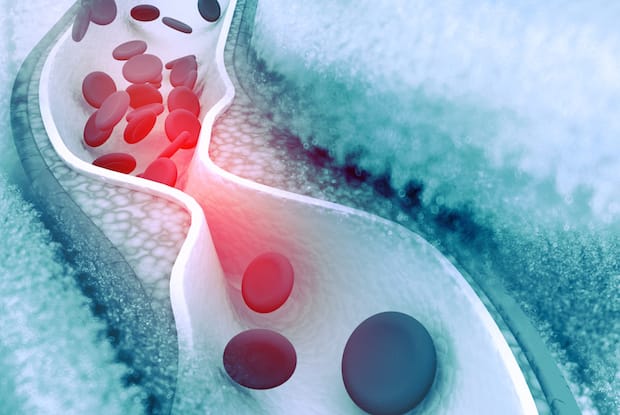Table of Contents
III. What is Zetia?
V. Reasons for a Zetia Prescription
VII. Interactions
VIII. How Should You Take Zetia?
What is Cholesterol?
Cholesterol is a necessary component of your blood that keeps us healthy. But, when cholesterol levels are too high, this can lead to serious health problems. Although you may not feel symptoms related to high cholesterol, it places you at a higher risk of cardiovascular events such as stroke and heart attack. Luckily, there are things you can do to prevent cardiovascular risk, such as healthy lifestyle changes, taking medications like Zetia, or both.
High cholesterol can affect anyone. Even if you are young, eat well, exercise, and maintain a healthy weight, you may still have high cholesterol. High cholesterol has several causes, and genetics and lifestyle have a big influence on cholesterol levels.
Cholesterol is a type of blood fat that is made in the liver and is also found in certain foods. Another name for this blood fat is called lipids. Cholesterol plays a vital role in keeping the body running properly. Having too much cholesterol in the blood can cause the arteries to clog and lead to future health problems.

The three main jobs of cholesterol include:
- It makes up a portion of the outer layer (membrane) of the body’s cells
- It is used to make bile, which helps you to digest fat
- It is used to make vitamin D and steroid hormones that help to keep bones, muscles, and teeth health [2]
As recommended by the organization Heart UK, women should aim for an HDL cholesterol (good cholesterol) level above 1.2mmol/L, whereas men should aim for above 1mmol/L.
Cholesterol (a lipid or blood fat) is carried in the blood from the liver (where it's made) to places where it's needed most in the body. While cholesterol is being carried through the blood, it's attached to proteins and other fats; together, cholesterol, proteins, and other fats form tiny balls known as lipoproteins.
Usually, when people talk about different forms of cholesterol, they are talking about lipoproteins. There are two main types of lipoproteins:
LDL Cholesterol (low-density lipoprotein)
- Also known as “bad” cholesterol
- This kind of lipoprotein contains lots of cholesterol
- LDL’s job is to carry cholesterol to cells that need it
- If there is too much LDL cholesterol, it can build up and clog the arteries
HDL Cholesterol (high-density lipoprotein)
- Also known as “good” cholesterol
- This kind of lipoprotein contains lots of protein, but very little cholesterol
- HDL’s job is to carry cholesterol away from cells and back to the liver where it is broken down and removed from the body
- HDL helps the body stay healthy and prevents disease [2]
Other types of lipoproteins include very-low-density lipoproteins (VLDL), intermediate-density lipoproteins (IDL), and chylomicrons.
What is High Cholesterol?
Too much cholesterol in the blood will cause it to be laid down alongside the walls of blood vessels in the body. A fatty area is known as plaque, which becomes harder with time and makes arteries more stiff and narrow. A buildup of cholesterol along the walls of blood vessels is called atherosclerosis. Atherosclerosis decreases blood flow, which decreases the blood supply to the brain, heart, and other regions of the body. Due to plaque, artery walls can narrow, or a blood clot (a complete blockage that cuts off blood flow) can form, causing a heart attack or stroke.
If the arteries clog, you are at an increased risk for:
- Coronary artery disease
- Angina (chest pain)
- A heart attack
- Heart failure
- Stroke
- Mini strokes (transient ischaemic attack TIAs)
- Peripheral artery disease
- Vascular dementia
What is Zetia?
Zetia is in a class of cholesterol-lowering prescription medications called cholesterol absorption inhibitors that are used to treat high cholesterol. Zetia is the brand name for the generic drug Ezetimibe, which comes as an oral tablet.
Zetia is generally prescribed as a combination therapy. Zeta is given alongside recommended lifestyle changes, including a healthy diet, weight loss, and exercise to reduce cholesterol and other fatty substances in the blood. [1] You may need to take other cholesterol-lowering medications with Zetia, as well. Always consult a doctor for questions about your prescription.
It is important to note that although Zetia works to lower cholesterol, it differs from another class of cholesterol-lowering medications known as statins. Statins function by reducing the liver’s production of cholesterol. Zetia works by preventing the absorption of cholesterol in the small intestine.

How Does Zetia Work?
Zetia is a drug that reduces LDL cholesterol (bad cholesterol) by reducing intestinal cholesterol absorption. Specifically, Zetia targets gastrointestinal absorption within the small intestine by inhibiting a particular cholesterol transport protein. A reduced cholesterol uptake in the intestine causes LDL cholesterol to be taken up by the liver from the blood. [3]
Reasons for a Zetia Prescription
Zetia is indicated as a combination therapy. The drug is generally prescribed alongside other lifestyle recommendations to improve cholesterol, such as a focus on a low-cholesterol healthy diet, exercise, and weight control. Because Zetia works differently than statins or other cholesterol-lowering medications, adding it to your current high-cholesterol treatment may prove to lower cholesterol even further.
It’s important to understand the dangers of taking Zeta with statin drugs if you have certain medical conditions such as liver disease. Always speak with your doctor about your prescription and any other medications you are taking.
Contraindications
There are several scenarios in which Zetia use is not recommended. This drug comes with several warnings, including a warning for people with certain health conditions, caution for people in certain groups (senior, pregnant, child), and an allergy warning.
You should not use Zetia if:
- You are a child
- You are an older person with compromised kidney function
You should not use Zetia if you have certain medical conditions such as:
- Liver disease (moderate to severe)
- Kidney disease
- Talk to your doctor if you have a thyroid disorder
Zetia, combined with a statin medication (Zocor, Lipitor, Crestor, and others) is not recommended if:
- You have liver disease
- You are pregnant
- You are breast-feeding
If you are taking Zetia, always inform your doctor if you are also taking statin cholesterol medication. Some cholesterol medications cause a condition that breaks down muscle tissue and leads to kidney failure. If you have kidney disease or a thyroid condition, you are at an increased risk of developing this condition. [4]
Allergy Warning
There is a risk that this drug can cause a severe allergic reaction. If you develop symptoms of an allergic reaction after taking this drug, seek emergency medical attention immediately.
- Symptoms of an allergic reaction may include:
- Swelling of the face, throat, tongue, lips
- Trouble swallowing or breathing
- Skin rash
- Hives

Interactions
Because Zetia is a medication, there is a risk that it can interact with other medicines, food, or vitamin and herbal supplements you are consuming. Interactions can either increase or decrease the effect of drugs in your system or create unwanted side effects.
Your doctor should be informed of all medications and supplements you take to avoid interactions. If you are taking one of the drugs listed below, your doctor may need to changes the doses of your medications or monitor you carefully for side effects. Please note this may not be a complete list of all the drug interactions with Zetia.
Zetia may interact with drugs, including:
- Immunosuppressants such as Cyclosporine — a drug used for organ transplants and rheumatoid arthritis
- Blood-thinning (anticoagulant) medications such as warfarin (Coumadin) and Jantoven
- Antihyperlipidemics (cholesterol-lowering) such as fenofibrate (TriCor) and colesevelam (WellChol)
- Fibrates (triglyceride-lowering) such as gemfibrozil (Lopid)
- Bile acid sequestrants such as cholestyramine (Questran) and colestipol (Colestid) [1]
How Should You Take Zetia?
Your doctor is the best person to speak with concerning dosage and administration of your prescription medications. This information should not be taken as medical advice.
Whether you are taking Zetia or a generic form of the drug, most commonly, a prescription is in 10 mg oral tablets and taken once a day. Your doctor considers a handful of factors when determining prescription dosage, time, and strength, such as:
- Age
- Condition being treated
- Severity of the condition
- Other medical conditions present
- Reaction to the first dose
If you stop taking the drug, your cholesterol levels may rise, increasing your risk for cardiovascular events (stroke, heart attack). If your symptoms are severe, call 911 or seek emergency help immediately. [5]
Common side Effects
Common side effects of Zetia include:
- Diarrhea
- Muscle and joint pain
- Stuffy nose and sinus pain
- Viral infection (nose, throat)
- Pain in an arm or leg
- Headache
Please note this is an incomplete list of side effects. Learn more about Zetia side effects.
Prevention is Key
A simple blood test can show how much of the different kinds of cholesterol you have in your blood. It's important to check your cholesterol levels regularly to give you an idea of your risk for heart disease and stroke. High cholesterol often has no symptoms and can result in a heart attack, so prevention is your best tactic to stay heart-healthy and keep your arteries free from blockages.
The content in this article is intended for informational purposes only. This website does not provide medical advice. In all circumstances, you should always seek the advice of your physician and/or other qualified health professionals(s) for drug, medical condition, or treatment advice. The content provided on this website is not a substitute for professional medical advice, diagnosis or treatment.
